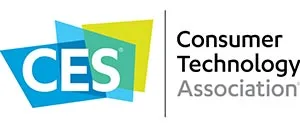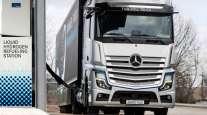Associated Press
Hydrogen Energy Back in the Vehicle Conversation at CES

[Stay on top of transportation news: Get TTNews in your inbox.]
LAS VEGAS — While electric vehicles are gaining the lion’s share of the attention for carbon-neutral technology at CES 2024, hydrogen energy has snuck its way back into the conversation thanks to two automotive giants.
Hyundai spotlighted its plans for utilizing hydrogen energy at the sprawling tech and gadget show in Las Vegas. Beyond making vehicles powered by hydrogen-powered fuel cells, the South Korean automaker signaled that it could work toward aiding a “hydrogen society” by expanding into energy production, storage and transportation.
It’s already technologically feasible, and it will eventually make sense economically, too, José Muñoz, president and global chief operating officer of Hyundai Motor Co., predicted Jan. 8.
Meanwhile, automotive supplier Bosch Mobility plans to launch its first hydrogen combustion engine this year — another key step toward reducing global man-made carbon emissions, the company said during its CES 2024 event.
Both Bosch and Hyundai say they’ve been encouraged to move forward with their respective initiatives because of investments such as the $7 billion that the U.S. government is pouring into the development of hydrogen infrastructure.

A newly unveiled concept car from Honda is displayed during the company's Jan. 9 news conference at CES. (Ryan Sun/Associated Press)
Honda on Jan. 9 unveiled two concept vehicles, dubbed the “Saloon” and “Space-Hub.” The Japanese automaker says the Zero Series approach for EV development focuses on models that are “thin, light and wise,” with specific goals to minimize battery size and weight.
Kia, meanwhile, introduced a trio of electric vans that can quickly swap body modules from cargo haulers to taxis and other purposes. Production of the vans will begin in 2025 in South Korea.
And Vietnam-based electric upstart VinFast unveiled an electric truck concept. The midsize truck is dubbed the VF Wild.
Mercedes-Benz showed off updates to its infotainment systems, including a new AI-powered virtual assistant that strives to personalize interactions between drivers and their cars. The update will connect the AI with functions for automated driving, seating comfort, data displays and charging.
But while automakers like Mercedes are focusing on improving their proprietary in-car ecosystems, others are striking more partnerships with Google to pre-install apps such as Google Maps and Assistant in their vehicles, the tech giant revealed at CES 2024.

The Google built-in will come to select models from Nissan, Ford Motor’s luxury brand Lincoln, and others this year, with Porsche following suit in 2025. And even Mercedes-Benz is layering Google apps into its own technology.
Honda also touched on plans for its Zero Series and wider EV advances down the road — notably, the company’s independent development of solid-state batteries. In a Jan. 9 news conference, Executive Vice President Shinji Aoyama said Honda aims to apply solid-state batteries to the Zero Series by the late 2020s.
Solid-state batteries are widely believed to be essential for mass commercialization of battery-powered EVs. Today, lithium-ion batteries are more commonly used in EVs, but are prone to fires. Solid-state batteries are more stable and potentially more powerful.
Honda Motor’s Mitsuru Kariya, who leads the research and development group behind the EV tech announced Jan. 9, explained that solid-state batteries have higher energy density, which means they can be smaller while maintaining a good range with stronger outputs. This could also contribute to making EVs lighter, he said, potentially improving mileage.
Honda isn’t the only automaker with eyes on a solid-state battery future. Toyota, for example, recently agreed to work with Japanese oil company Idemitsu on technology solid-state battery production.
— Associated Press reporter McKinnon de Kuyper contributed to this report.
Want more news? Listen to today's daily briefing below or go here for more info:




